OUR WORLD makes it fun and easy for children to learn more about the world around them. With more than 40 maps, 300 images, and hundreds of facts and statistics, this atlas will expand every child’s view of each country around the globe.
Sports
Lockie Leonard, Scumbuster
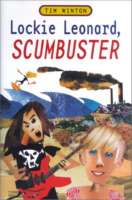
Nothing’s simple for Lockie Leonard. He’s only lived in town for a year and his dad’s the local police sergeant, two facts that don’t win Lockie any popularity contests. Dumped by his popular girlfriend, he’s back to being the loneliest kid in town until he makes friends with Geoff Eggleston, or Egg, the weirdest human being Lockie’s ever known. Egg is a dark-haired, pimply-faced, very bright “Metal Head” who can’t even swim, though their town is right on the Australian coast. By contrast, Lockie is a trim, blond, expert surfer. Lockie and Egg decide to somehow clean up the town’s harbor, partly covered with scum from industrial waste. In the middle of all their planning, Lockie falls in love again, with a girl who turns out to be only eleven. To make it worse, she surfs better than he does, though he’s the best in his school. Can a thirteen-year-old surfrat have a headbanger for a best friend, stay in love with an eleven-year-old gremmie, and still save his town from industrial pollution? Tim Winton is a prize-winning Australion novelist whose The Riders was short-listed for the 1996 Booker Prize. He himself is an, expert surfer. With rich characterization, strong narrative drive, and much humor, Winton has written a contemporary story that reflects the concerns of all teenagers and will reach a wide audience.
The Edge
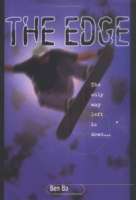
No one understands Declan. Not his mother or his father or his teachers. No one but maybe his new group of friends. After moving, Declan will do anything to fit in at his new school, even if it is illegal. When he and his new friends get caught, the consequences are tragic. Given a second chance that he is not sure that he wants, Declan is sent to work at a ski lodge in the Canadian Rockies. Though he is not locked up, he feels trapped and lonely, and learns that second chances aren’t easy. While there, Declan learns to snowboard and meets new friends, but the ghosts of his past keep rising up to haunt him. Standing on the edge, Declan realizes that the only way to break free is to face his past, and to look forward to the future.
The Snake-Stone

Fifteen-year-old James, a championship diver, finds himself torn between his dreams of Olympic glory, his love for his adoptive parents, and his desperate need to find his birth mother.
Pele, King of Soccer/Pele, El Rey Del Futbol
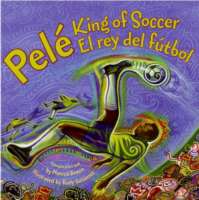
This book tells how a poor boy from Brazil who loved fútbol more than anything else became the biggest soccer star the world has ever known.
Fighting Ruben Wolfe
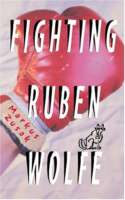
Cameron and Ruben Wolfe come from a family clinging to the ragged edge of the working class. To make money, the boys hook up with a sleazy fight promoter who sees something marketable in the untrained brothers¹ vulnerability. But the Wolfe brothers are fighting for more than tips and pay-off money. It soon becomes a fight for identity, for dignity, and for each other.
Duke’s Olympic Feet
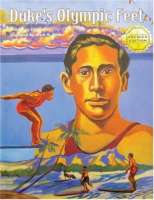
Duke Kahanamoku was the twentieth century’s top waterman, and is known as the “father of international surfing.” The first Hawaiian to win an Olympic gold medal, Duke represented the United States in the Olympic Games in 1912, 1920, 1924 and 1932, winning gold, silver and bronze medals. Born in 1890, Duke grew up next to the ocean in Waikîkî. After school, he and his sister and brothers would hit the water. “I was only happy when I was swimming like a fish,” Duke said. Duke and the other beach boys gathered under a hau tree in Waikîkî. They rode the waves at Castles, a prime surf spot, on their sixteen-foot solid wooden surfboards. Years of swimming, surfing and canoe paddling made Duke a fine athlete. He had a strong body, long arms, powerful legs and his hands were said to be as big as buckets. Some claimed he had feet as big as fins and could steer a canoe with his feet alone. Duke knew that he was a very fast swimmer and he trained constantly. He said that God had given him a gift and a whip. “The whip,” he said with a grin, “is to flog myself into getting the most out of the gift.” He felt that, just maybe, he could be a champion and win Olympic gold for Hawai‘i. His chance came August 12, 1911, at Alakea Slip in Honolulu Harbor, when he demolished the world amateur record for the 100-yard freestyle. His excitement was crushed when mainland AAU officials refused to believe his time. “What are you using for stopwatches over there in Hawai‘i?” they asked. “Alarm clocks?” The AAU officials doubted that a virtually untrained swimmer could break a world record. It was up to Duke to prove he could go up against the world’s fastest swimmers and beat them. Along with his athletic accomplishments, Duke is remembered for his concern for others, humility in victory, courage in adversity and good sportsmanship.
Take a closer look at Duke’s Olympic Feet as examined in WOW Review.
Hans Brinker
The story of Hans Brinker is a true classic, but few still read the novel, which was written in the 1860s. This is a tale of a family sticking together through hardship, and of wishes granted just in the nick of time. The race to win the silver skates is well-known, but the mystery of the watch and the missing riches is equally enticing.
Keeper
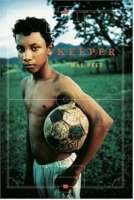
An enthralling story of a poor and gawky kid who mysteriously becomes the world’s greatest goalkeeper — a seamless blend of magic realism and exhilarating soccer action.”And you found it, this thing you were looking for?”It was darker now, and the city below Faustino’s office was a jazzy dance of neon signs and traffic. The big man went to the window and looked down at it all, spreading his large hands on the glass. “No,” he said. “It found me.”When Paul Faustino of LA NACION flips on his tape recorder for an exclusive interview with El Gato — the phenomenal goalkeeper who single-handedly brought his team the World Cup — the seasoned reporter quickly learns that this will be no ordinary story. Instead, the legendary El Gato (“The Cat”) quietly narrates a spellbinding tale that begins in a mythic corner of the South American rain forest, where a ghostly but very real mentor, the Keeper, emerges to teach the gangly boy the most thrilling secrets of the game. Combining vivid imagery and heart-stopping action, this evocative, strikingly ethereal novel about loyalty, passion, and magic will haunt readers, regardless of their love for soccer, long after the story is ended.
The Penalty
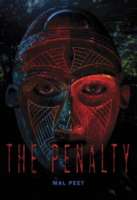
Paul Faustino, known as the best soccer journalist in the business, reluctantly investigates the disappearance of 18-year-old Ricardo, a soccer prodigy known as “El Brujito,” while in alternate chapters a slave in old San Juan becomes a powerful voodoo priest.
